The Rise of Conversational AI: Chatbots and Virtual Assistants
-
Caploitte
-
12 Feb 2024
-
04 Min Read
What is Chatbot?
The Benefits of Chatbots Powered by AI
What is a Virtual Assistant?
Significant differences between AI virtual assistants-and chatbots
AI Chatbots Future
Conversational AI’s beneficial impact on society
Conversational AI Applications for Businesses
Conclusion
Within the quickly evolving field of artificial intelligence, conversational AI is a notion that is gaining traction and altering how individuals and companies utilize technology. Anticipate the emergence of conversational AI, or technology capable of intelligent mutual communication that blurs the lines between artificial and human intellect. App exhaustion was the main cause of the anticipation that bots would be the next big thing.
Nowadays, consumers use applications made by Apple, Google, and Facebook the majority of the time. Spotify and Netflix employ AI to personalize their content recommendations for you. Siri, Alexa, and Google Assistant also make use of it. The artificial intelligence (AI) of the future is conversational. In this piece, we’ll take a close look at the latest advancements in conversational AI and how they affect businesses.
What Is A Chatbot?
Essentially, chatbots are natural language text interfaces built with rules to promote pre-programmed, sequential communication. They are usually simple to construct and use, with pre-established flows. Chatbots are AI-powered applications made to converse with clients via text or voice. In addition to processing orders, giving product information, and even addressing typical difficulties, they are capable of completing a wide range of responsibilities. Chatbots use natural language processing (NLP) to interpret language semantics and syntax, determine the intended response, and use dialog trees and retrieval-based techniques. NLP and dialog modeling are also used by voice assistants that specialize in spoken queries, such as Siri, Alexa, Google Assistant, and Cortana. In order to do tasks through natural voice interactions, they analyze audio signals, detect words, comprehend context, and comprehend user preferences.
The Benefits of Chatbots Powered by AI
Businesses across all sectors are using conversational AI to provide appealing self-service choices that automate frequently asked questions, fix problems, schedule appointments, and more. By doing this, call center workloads can be decreased, interactions can be made more personalized, and better customer experiences can be delivered at scale.
The 24/7 accessibility of AI chatbots is another important advantage. Virtual assistants are always on hand to provide consumers with assistance, unlike actual customer service workers who have set working hours. This is especially helpful for people who work late hours or have pressing questions that require quick attention.
AI chatbots are incredibly effective and able to manage a huge amount of requests since they can answer many questions at once. Because of its scalability, companies can offer excellent customer service without having to hire a big staff of agents, which saves them a lot of money.
What is a Virtual Assistant?
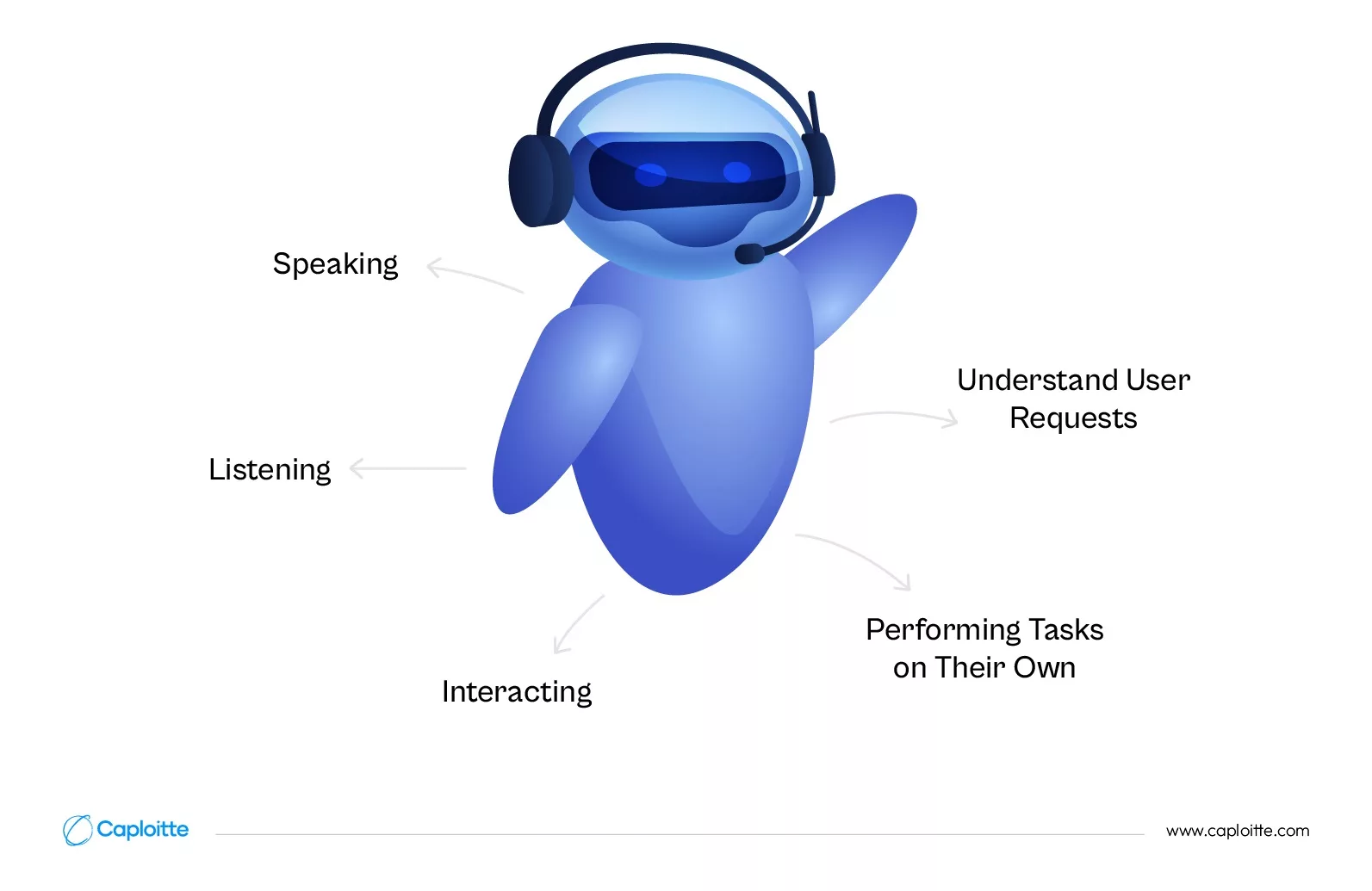
One significant development in the field of artificial intelligence (AI) is the introduction of AI-powered virtual assistants. Artificial intelligence (AI)-powered software programs known as virtual assistants are capable of speaking and listening to humans, interacting with them, and performing tasks on their own—often without the aid of a person. AI-driven platforms known as intelligent virtual agents, or virtual assistants, enable more sophisticated conversations with clients. They employ deep learning, natural language processing (NLP), and machine learning approaches to understand user requests and respond appropriately. Because virtual assistants are capable of comprehending user preferences and context, they can offer tailored experiences.
The Benefits of Virtual Assistants Powered by AI
Virtual assistants powered by AI are excellent at automating tedious jobs, which saves users a ton of time and effort. These assistants effectively manage routine tasks, freeing users to concentrate on more important tasks. Examples of these tasks include creating emails, organizing calendars, and generating reminders.
To provide individualized recommendations and replies, virtual assistants examine user behavior and preferences. They gain knowledge from interactions over time, improving their ability to cater to specific demands and improving the user experience as a whole.
AI-driven virtual assistants optimize workflows in both personal and professional contexts, allowing users to work more quickly and effectively. They can quickly access and process enormous volumes of data, offering insightful analysis and assistance.
Multilingual virtual assistants may speak many languages, removing linguistic barriers and serving a wide range of users. This function promotes diversity and opens up these helpers to a worldwide user base.
Significant differences between AI virtual assistants and chatbots
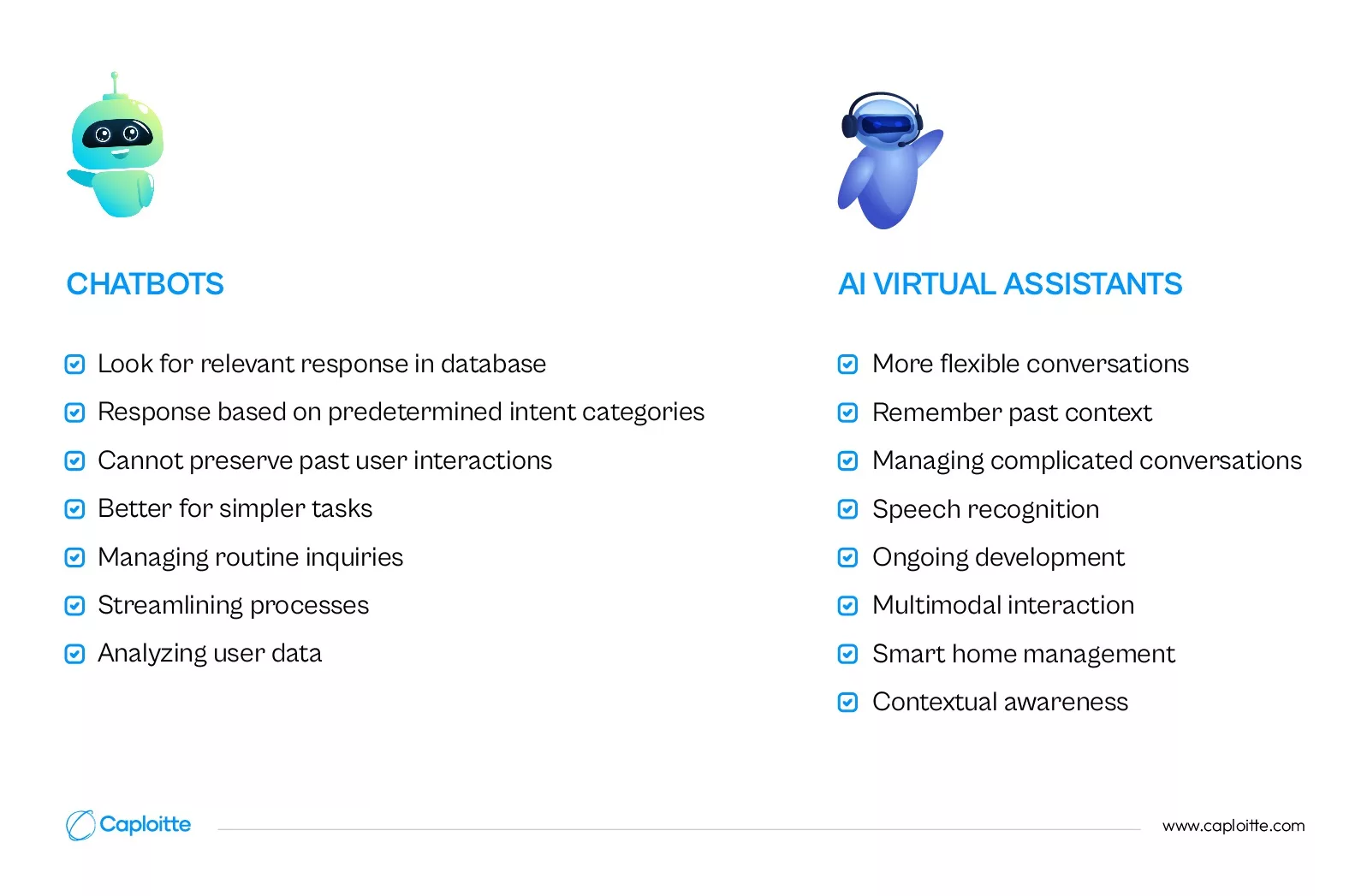
AI virtual assistants and chatbots are appropriate for various jobs of differing complexity.
Uses and performance
Chatbots and AI virtual assistants both accept text, image, and voice input from users, but they approach questions and input in different ways. Chatbots analyze user input to identify what the user wants, look for a relevant response in a database, and then provide a response based on predetermined intent categories.
End users’ interactions with software are impacted by conversational interfaces. The UI of most chatbots is task-focused. Interactions with chatbots can also follow a predetermined course, although they struggle to remember past user interactions due to their poor contextual awareness.
AI virtual assistants have more flexible conversational interfaces that may change to suit the needs of the user. In addition, this digital virtual assistant can remember context, which allows it to look up prior questions and answers and facilitate smooth, conversational interactions.
Digital virtual assistants are better at managing complicated conversations, but chatbots are often better suited for simpler tasks. More sophisticated features like speech recognition, ongoing development, multimodal interaction, and smart home management are available in AI virtual assistants like Siri and Alexa. Additionally, chatbots excel at managing routine inquiries and streamlining processes.
Engagement and experience of customers
AI chatbots increase client engagement by responding quickly and personally. With these tools, clients may get assistance at any time of the day or night. Artificial intelligence (AI) chatbots are capable of analyzing user data, such as behavior, preferences, and tastes, and using the results to provide a customized user experience.
AI virtual assistants offer individualized conversational experiences by utilizing machine learning, deep learning, and big data. Also, contextual awareness is maintained by digital virtual assistants, which enables them to converse with users in a manner akin to that of humans.
Advantages of Customer Service Driven by AI
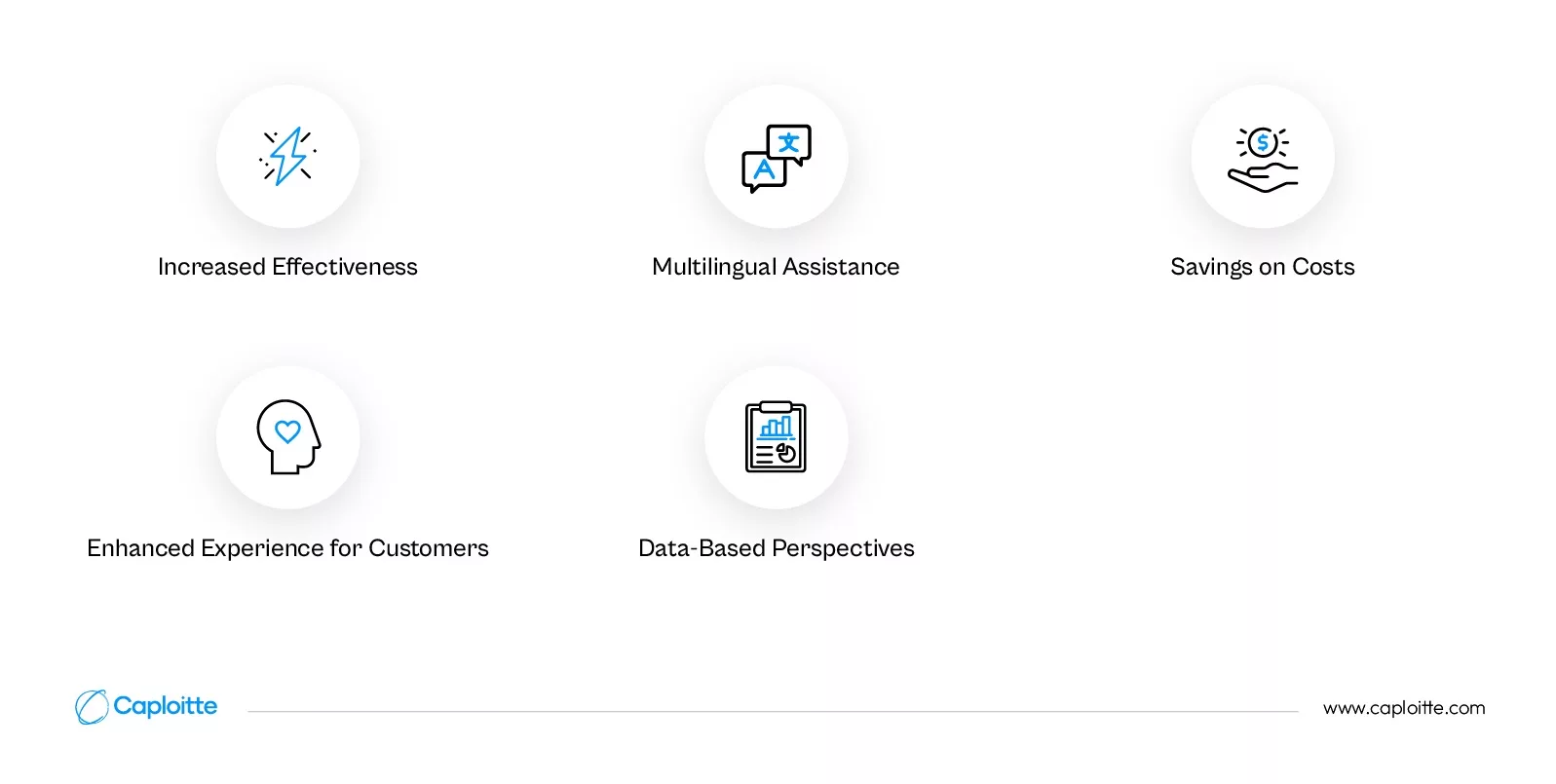
AI-powered customer care has many strong benefits for companies, including:
1. Increased Effectiveness:
The capacity of AI chatbots to offer prompt, tailored support is one of its primary benefits. Automation guarantees that regular chores are handled quickly and cuts down on response times. Virtual assistants may swiftly comprehend and respond to consumer inquiries in a more effective and customized way than traditional customer service systems, which sometimes necessitate lengthy wait periods and generic replies. This improves the user experience overall in addition to saving time.
2. Multilingual Assistance
Roughly 40% of customers worldwide refuse to do business with an organization that does not speak their language. Support in many languages is crucial if you have clients outside of the US. Use conversational AI to provide multilingual help rather than paying service representatives; this will be a more economical option. As they can in English, conversational AI solutions can converse with your clients in their native tongue and provide tailored messaging.
3. Savings on Costs:
Conversational AI lowers expenses in a variety of areas, including account management and customer support. By using AI to scale customer care and automate repetitive processes, businesses may save operating expenses. When a person is assigned to a strategy, the return on investment is higher and the cost of customer service is significantly reduced.
4. Enhanced Experience for Customers:
AI for conversations facilitates scaling customer support. More than half of consumers hired the first steadfast to answer, even if it was more costly, and two-thirds of customers believe that reaction speed is just as essential as pricing. Availability around-the-clock and personalization improve the whole customer experience, which raises customer happiness.
5. Data-Based Perspectives:
Interactions between customers and AI systems produce useful data that can be examined to enhance goods, services, and advertising tactics. Virtual assistants and chatbots eliminate human mistakes by giving clients consistent information and replies.
AI Chatbots Future
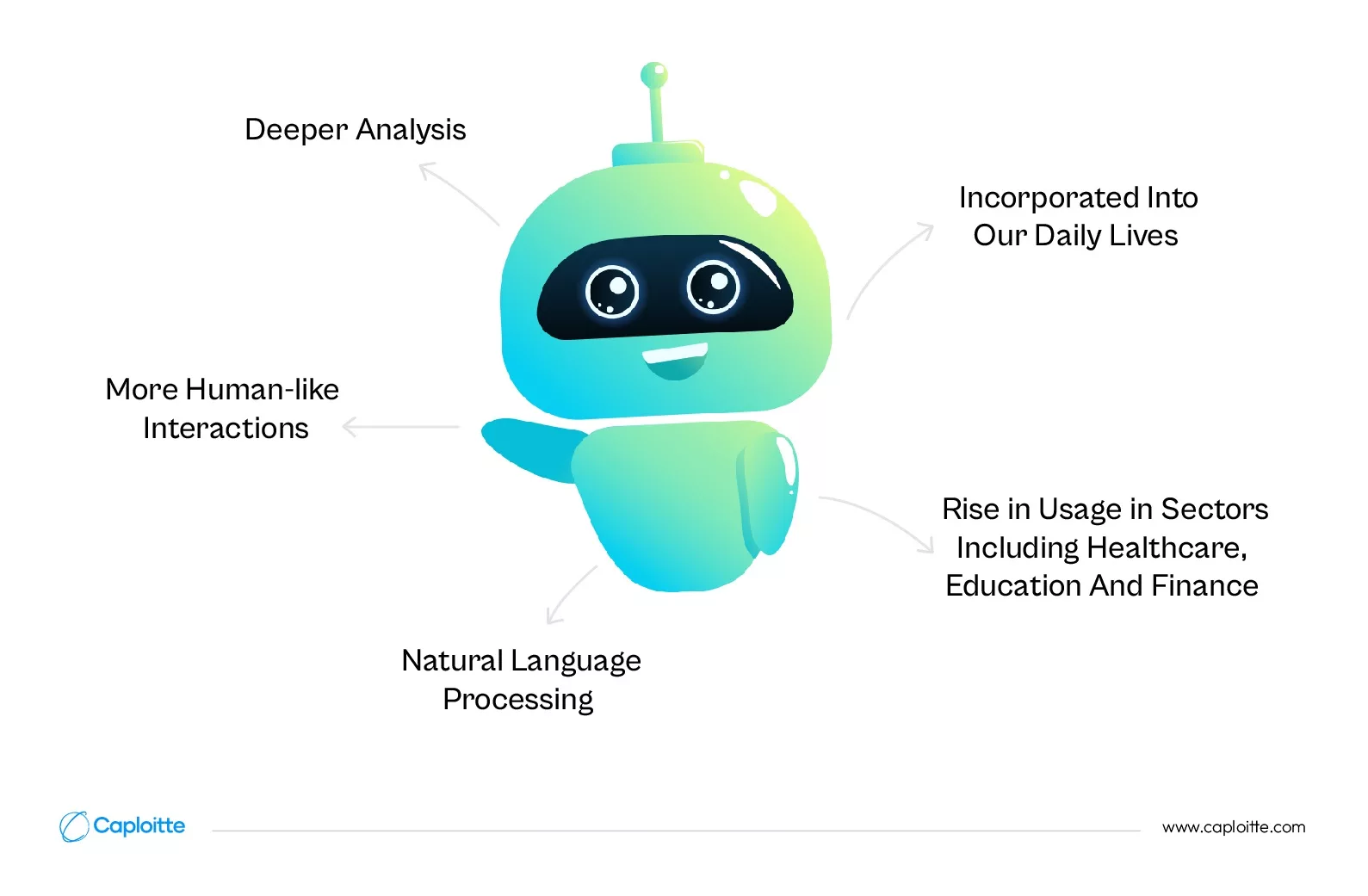
It is anticipated that chatbot skills will increase in sophistication as AI technology develops. Conversational AI will continue to advance in its current field. Improved problem-solving, deeper analysis, and more human-like interactions. Artificial intelligence chatbots are likely to acquire better natural language processing capabilities in the future, enabling them to understand and respond to complex queries with more accuracy.
AI chatbots are also probably going to be incorporated into our daily lives more and more. With the help of this connection, users will be able to easily communicate with virtual assistants and complete tasks with a few voice commands.
Furthermore, sectors including healthcare, education, and finance will see a rise in the use of AI chatbots. They will help physicians diagnose ailments, provide pupils with individualized teaching, and provide financial guidance based on each person’s spending patterns. These developments might transform these sectors and raise the standard of services as a whole.
Conversational AI’s beneficial impact on society

Artificial intelligence (AI) powered chatbots and virtual assistants offer a great deal of assistance and convenience that extends beyond personal use; with time, they break through restrictions and become available to new businesses. According to statistics, text-to-speech technologies are statistically more popular than other kinds and show a notable expansion in the technology sector. With its wide range of applications, Text-to-Speech has made a name for itself as a leading provider of tools for understanding consumer demands, from the medical profession to corporate needs.
A smart artificial intelligence (AI) tool could fill the knowledge gap between teachers and students by understanding and analyzing students’ deficiencies and making appropriate adjustments. In a similar vein, medical crises may also be handled by these intelligent chatbots. In a real-world medical emergency, there might not be enough trained individuals to respond; in this case, AI chatbots step in and offer crucial guidance on how to help.
Conversational AI Applications for Businesses
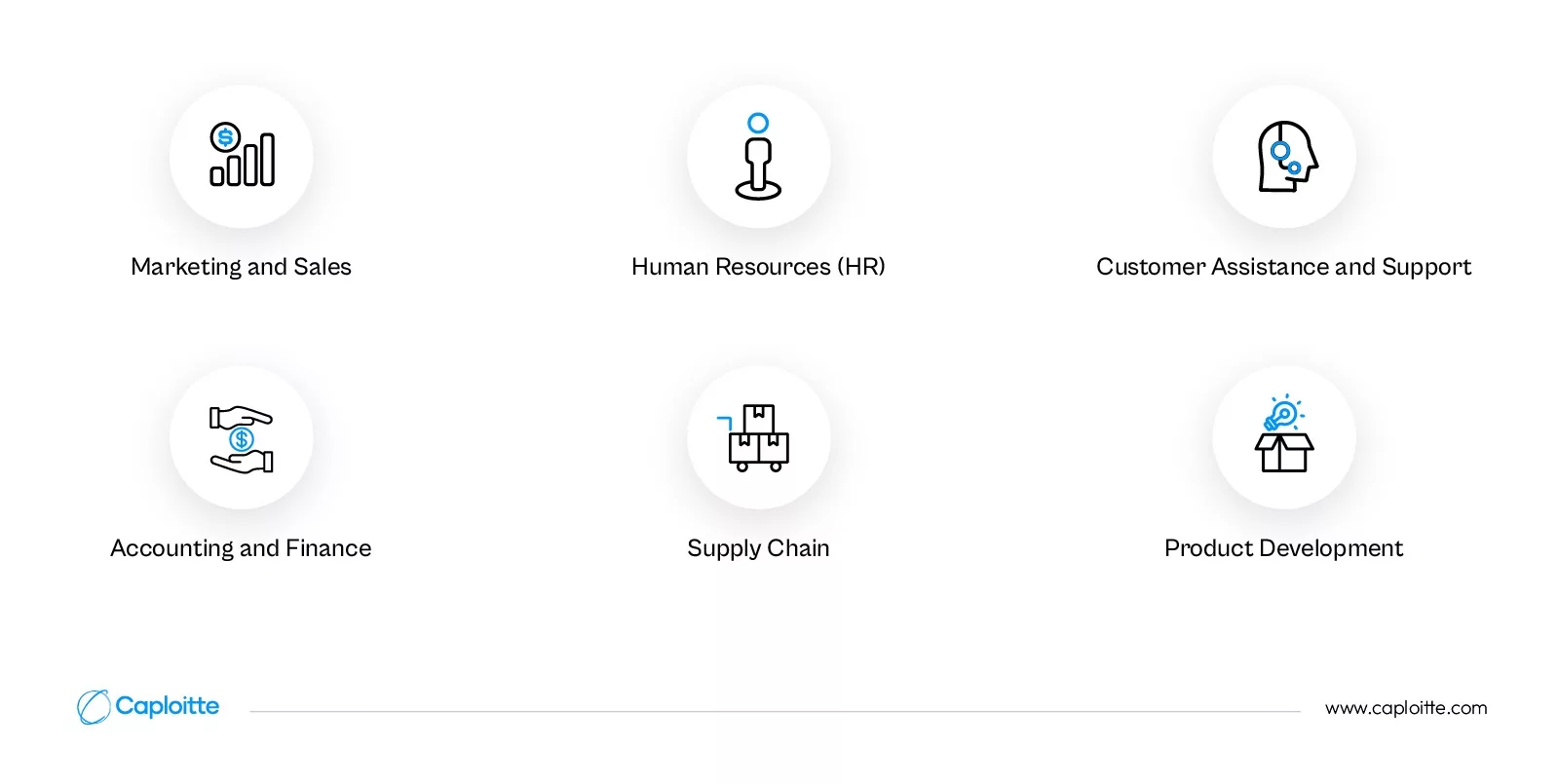
Marketing and Sales
One of the most important uses of conversational AI is in the field of sales and digital marketing. Chatbots, virtual assistants, and audio assistants are examples of conversational AI systems that may provide organizations with a more individualized approach to customer care. Lead generation is a significant additional use of conversational AI in sales and marketing. Businesses can find potential clients and learn more about their wants and interests by utilizing chatbots and voice assistants. To better equip the salesperson when a client contacts, the bot may even gather information on the customer, including location and car make and model.
Human Resources (HR)
Human resources is one area where AI chatbots are having a big influence. Businesses may automate several time-consuming and repetitive HR operations, including organizing interviews, responding to employee inquiries, and handling payroll, by implementing intelligent chatbots. Chatbots can help HR departments handle hiring more efficiently by giving job hopefuls pertinent information about the organization and pre-screening them. Employee happiness and engagement are also being enhanced by the usage of AI chatbots in HR. Furthermore, chatbots can offer automated onboarding and training, assisting new hires in swiftly becoming familiar with corporate rules and processes.
Customer Assistance and Support
By using the company’s knowledge base, customer data analysis, and insights learned from previous encounters, these bots can swiftly and reliably answer client concerns and offer tailored recommendations and real-time solutions. Conversational AI technology can support human agents by automating repetitive operations like data input, booking appointments, and order processing, and by giving them real-time insights into customers and possible answers. Furthermore, conversational AI can help businesses gather insightful and useful client feedback, allowing them to anticipate problems, see patterns, and make ongoing improvements to their goods and services in response to consumer demands.
Accounting and Finance
The financial and accounting sectors are among those where conversational AI is having the biggest effects on enterprises. Businesses can profit from conversational AI by using it to manage transactions, reconcile finances, and spot fraud. Additionally, conversational AI could offer companies instant access to financial data, enabling them to make deft judgments and modify their plans as necessary. Finance and accounting are being revolutionized by conversational AI, which makes it possible for companies to become more successful, efficient, and customer-focused.
Supply Chain
A crucial component of corporate operations is supply chain management, and conversational AI is playing a more and bigger role in the supply chain. Conversational AI could set up time for people to work on more specialized duties by automating repetitive operations like order processing and customer service. By providing a real-time picture of a company’s supply chain, conversational AI helps managers respond quickly to unforeseen circumstances like weather-related problems, supplier outages, and shifts in demand.
Product Development
Businesses may utilize conversational artificial intelligence (AI) to produce new products in a variety of ways as a result of its breakthroughs. Businesses can create more individualized and user-friendly products that appeal to their customers by utilizing conversational AI. Businesses may enhance client experiences and provide individualized advice with the use of chatbots. Companies can utilize voice assistants’ features to increase the usability, accessibility, and convenience of their goods.
Conclusion:
In conclusion, conversational interfaces—which are augmented by AI—will soon be favored for many consumer questions over phone calls or emails. Chatbots and virtual assistants, at the forefront of AI-powered customer care, are revolutionizing the way companies engage with their clientele. Chatbots and virtual assistants will revolutionize how we communicate with companies and get assistance in our daily lives as systems continue to advance. We could expect ever more complex and customized interactions as AI technology develops, which will eventually lead to great customer service and boost company performance in the digital era.
Share this post:
Read More
- All
- AI
- AR
- DevOps and CI/CD
- E-commerce
- FinTech
- IoT
- Mobile Development
- Outstaffing
- Security
- SEO
- Tech Trends
- Web Design
- Web Development




